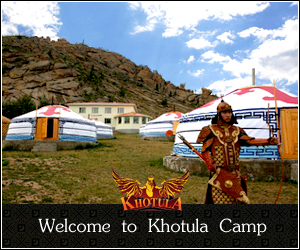Nomadic Customs and Traditions
Mongolian customs are unique traditions formed during the development of central Asian nomadic civilization, which has been passed on from generation to generation of Mongols over the centuries. Mongolian customs and traditions encompassed all aspects of life; the intellect. Mongolian customs and traditions have their own peculiarities and specific features, the likes of which are distinguished from other nations, and have been recorded by both Mongolian and foreign scholars in their research. Along with a healthy and normal physical upbringing, much attention was paid to the intellectual, moral and ethical development of a child, even when unborn. Furthermore, it was forbidden to cross a pregnant woman when walking, to say bad words in her presence, to swear or even speak in a loud voice. Such traditions came from the deep respect and care given to an unborn child, who, it was considered, might become a genius, an esteemed and distinguished statesman, or just a dear and faithful person for his parents, relatives and community. Particular attention was paid to children’s toys and games in order to make children smart, clever, intelligent, honest and trustworthy; games and toys created and invented by the Mongols prove this.
Such traditions came from the deep respect and care given to an unborn child, who, it was considered, might become a genius, an esteemed and distinguished statesman, or just a dear and faithful person for his parents, relatives and community. Particular attention was paid to children’s toys and games in order to make children smart, clever, intelligent, honest and trustworthy; games and toys created and invented by the Mongols prove this.  For example, playing horse racing with shagai (sheep or goat’s anklet bone), guessing the sum of anklebones in one’s hand, setting the so-called “alag melkhii” (multicolored frog), bone shooting, and shagai shuurekh game played with anklebones. One of the established norms of behavior of the Mongols was the tradition of greeting and saluting each other with respect and honor.
For example, playing horse racing with shagai (sheep or goat’s anklet bone), guessing the sum of anklebones in one’s hand, setting the so-called “alag melkhii” (multicolored frog), bone shooting, and shagai shuurekh game played with anklebones. One of the established norms of behavior of the Mongols was the tradition of greeting and saluting each other with respect and honor.
 Such traditions came from the deep respect and care given to an unborn child, who, it was considered, might become a genius, an esteemed and distinguished statesman, or just a dear and faithful person for his parents, relatives and community. Particular attention was paid to children’s toys and games in order to make children smart, clever, intelligent, honest and trustworthy; games and toys created and invented by the Mongols prove this.
Such traditions came from the deep respect and care given to an unborn child, who, it was considered, might become a genius, an esteemed and distinguished statesman, or just a dear and faithful person for his parents, relatives and community. Particular attention was paid to children’s toys and games in order to make children smart, clever, intelligent, honest and trustworthy; games and toys created and invented by the Mongols prove this.  For example, playing horse racing with shagai (sheep or goat’s anklet bone), guessing the sum of anklebones in one’s hand, setting the so-called “alag melkhii” (multicolored frog), bone shooting, and shagai shuurekh game played with anklebones. One of the established norms of behavior of the Mongols was the tradition of greeting and saluting each other with respect and honor.
For example, playing horse racing with shagai (sheep or goat’s anklet bone), guessing the sum of anklebones in one’s hand, setting the so-called “alag melkhii” (multicolored frog), bone shooting, and shagai shuurekh game played with anklebones. One of the established norms of behavior of the Mongols was the tradition of greeting and saluting each other with respect and honor. Elders, distinguished and honored persons are greeted first and the young ones respond to them in well-wishing and respectable manner. Hand-shaking, while greeting each other, was not desirable, as the touching of hand of an honored and respected person was considered impolite and a violation of tradition. The most venerable greeting would involve a person tightly buttoning his clothes, tightening his belt, putting his hat on, extending his right hand while bowing three times and touching his forehead with his fingers.  This was considered the most popular and traditional style of greeting, and was conducted during ceremonies held in officials’ palaces or at their homes. When meeting respected guests on the open steppe, one should put his clothes in order, place the palm of his right hand to his heart and bow therefore displaying deep respect. Ordinary folk upon greeting each other, spoke words of well wishes regarding his or her occupation, the following words were pronounced: “Sureg amgalan sun shim arvin boltugai” (Let the herd be peaceful and milk be in abundance). Upon meeting a person traveling to a faraway place the following was said: “Altan shar zam tani ulziitei baih boltugai” (Let your journey be safe and successful”). The greeting bestowed upon a person sewing was “Uil uran uter turgen butekh boltugai” (Wish your needlecraft be elegant and completed quickly).
This was considered the most popular and traditional style of greeting, and was conducted during ceremonies held in officials’ palaces or at their homes. When meeting respected guests on the open steppe, one should put his clothes in order, place the palm of his right hand to his heart and bow therefore displaying deep respect. Ordinary folk upon greeting each other, spoke words of well wishes regarding his or her occupation, the following words were pronounced: “Sureg amgalan sun shim arvin boltugai” (Let the herd be peaceful and milk be in abundance). Upon meeting a person traveling to a faraway place the following was said: “Altan shar zam tani ulziitei baih boltugai” (Let your journey be safe and successful”). The greeting bestowed upon a person sewing was “Uil uran uter turgen butekh boltugai” (Wish your needlecraft be elegant and completed quickly).
 This was considered the most popular and traditional style of greeting, and was conducted during ceremonies held in officials’ palaces or at their homes. When meeting respected guests on the open steppe, one should put his clothes in order, place the palm of his right hand to his heart and bow therefore displaying deep respect. Ordinary folk upon greeting each other, spoke words of well wishes regarding his or her occupation, the following words were pronounced: “Sureg amgalan sun shim arvin boltugai” (Let the herd be peaceful and milk be in abundance). Upon meeting a person traveling to a faraway place the following was said: “Altan shar zam tani ulziitei baih boltugai” (Let your journey be safe and successful”). The greeting bestowed upon a person sewing was “Uil uran uter turgen butekh boltugai” (Wish your needlecraft be elegant and completed quickly).
This was considered the most popular and traditional style of greeting, and was conducted during ceremonies held in officials’ palaces or at their homes. When meeting respected guests on the open steppe, one should put his clothes in order, place the palm of his right hand to his heart and bow therefore displaying deep respect. Ordinary folk upon greeting each other, spoke words of well wishes regarding his or her occupation, the following words were pronounced: “Sureg amgalan sun shim arvin boltugai” (Let the herd be peaceful and milk be in abundance). Upon meeting a person traveling to a faraway place the following was said: “Altan shar zam tani ulziitei baih boltugai” (Let your journey be safe and successful”). The greeting bestowed upon a person sewing was “Uil uran uter turgen butekh boltugai” (Wish your needlecraft be elegant and completed quickly).












